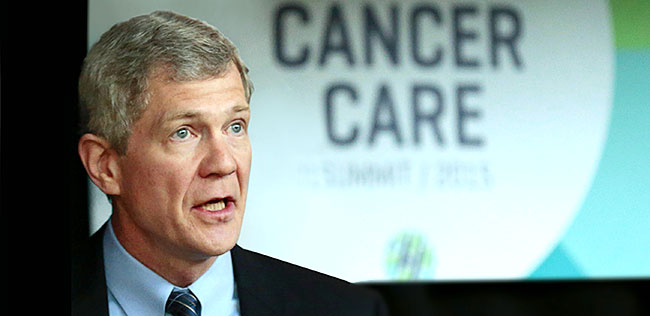News
Pioneering a New Understanding of Cancer Care Economics
LDI Alumnus Scott Ramsey Provides New Insights on Financial Distress as Adverse Side Effect

Scott Ramsey, who began his health services research career as a student at University of Pennsylvania and scholar at the Leonard Davis Institute of Health Economics (LDI) is now a leading national authority on the health economics of cancer care. This is the first in a series of articles that will spotlight LDI Alums’ achievements in the fields of health policy and service research as LDI moves toward the celebration of its 50th Anniversary in 2017.
In a February, 2013, Oncology article entitled “Financial Toxicity: A New Name for a Growing Problem,” scientists at Duke University coined a new term suggesting that the high costs of cancer care had the potential to actually affect the health of patients. But they also noted the association between extreme financial distress and cancer-related outcomes had not yet been scientifically assessed.
Three months later in May of 2013, Health Affairs published a study led by health economist Scott Ramsey, MD, PhD, that began to generate evidence related to that hypothesis. He and his team at Seattle’s Fred Hutchinson Cancer Research Center conducted one of the largest, high quality investigations of the potential for “financial toxicity” following cancer diagnosis. Linking cancer registry and federal bankruptcy records, the researchers found that cancer patients were 2.65 times more likely to declare bankruptcy than people without cancer.
Link to mortality
In a second, related study published earlier this year, Ramsey’s team found that cancer patients who DO declare bankruptcy are more likely to die prematurely and that their risk varies according to the kind of cancer they have. For instance, bankrupt colorectal patients are 2.5 times more likely to die than patients afflicted with the same cancer who do not experience bankruptcy.
“Together, these studies suggest that the financial consequences of cancer are extreme for thousands of patients and families, affecting not only their financial well-being, but their very survival,” said Ramsey. He is Director of the Hutchinson Institute of Cancer Outcomes Research (HICOR) and holds professorial appointments at the University of Washington’s Schools of Medicine, Public Health, and Pharmacy.
Ramsey is also an early 1990s alumnus of the University of Pennsylvania Wharton School’s Health Care Management program and the affiliated Leonard Davis Institute of Health Economics (LDI). As part of its 2017 50th Anniversary celebration, LDI is spotlighting a number of its former students like Ramsey who have gone on to careers characterized by significant health services research achievements.
Leading national authority
Ramsey’s stream of studies and articles have made him a leading national authority in the field of cancer care economics at a time when those costs have become a major point of contention in the ongoing national debate about health care reform. At the same time, his work has generated broad exposure across media outlets ranging from the New York Times and the Washington Post, to the Associated Press and Reuters, to the Britain’s Guardian and the AllAfrica News Network. https://www.youtube.com/embed/W7oZIsc9pbI?feature=oembed
In this 4-minute video excerpt from his recent presentation at Penn, Scott Ramsey details his latest research of the impact of extreme cancer care costs on patients’ fiscal stability as well as their cancer treatment outcomes.
For both the roots of his research methods as well as his media savvy, Ramsey looks back at the early 1990s experiences that shaped him. Early in that decade and on leave from the University of Iowa Medical School to pursue a PhD in health services research at Penn, Ramsey was also working as a health analyst for the U.S. Senate Budget Committee.
“I went through an entire budget cycle,” he explained. “It really affected my understanding of how all this intellectual stuff gets filtered and how little of it is actually getting into policy. People there (on Capitol Hill) don’t use the same language we academics use. I realized that I had to learn to talk THEIR language if I was going to make an impact with my research.”
Interdisciplinary research community
A second career epiphany occurred for Ramsey back on campus at LDI where he was immersed in a community of health services research scientists from a variety of schools across Penn including Wharton, Medicine, Nursing, Dental, Law and the Children’s Hospital of Philadelphia.
LDI Senior Fellow and Wharton School economics professor Mark Pauly was Ramsey’s PhD mentor and remembers him well. “Scott was the quickest on the uptake of all of my students when it came to adapting economics to the practice of medicine,” Pauly said. “And he certainly took to heart the admonition that society should not waste resources on health care but also not pass up effective care either — and has since become a leader in cost effectiveness analysis.”
Ramsey, the son of an Iowa hospital system CEO, said his time as a student at Penn and LDI made him fully realize that “economics was really going to be driving the future of health care. You could see it in the technologies that were emerging and the costs associated with those technologies,” he said. “Part of this came from my perspective of knowing a lot of the financial issues that my father was dealing with back then.”
Distinctively different environment
“When I arrived at Penn I was surprised at the interdisciplinary emphasis that brought in researchers from economics, medicine, accounting, marketing, management,” Ramsey said. “The interdisciplinary environment was so distinctive; you could see that other places didn’t have that like they did at LDI.”
“Everything I touched at LDI involved multiple perspectives from multiple disciplines,” Ramsey said. “It was just so exciting and so much fun to be sitting around a table and listening to the perspectives of people like John Eisenberg, Sandy Schwartz, Mark Pauly, Pat Danzon, John Kimberly and Sankey Williams. The place was filled with a sense of optimism about how things could be changed that I still carry with me. It all made me realize that THIS is how you should do research and that’s pretty much how I’ve modeled my own research ever since.”
“I would even argue,” Ramsey continued, “that LDI kind of invented translational research in the health services research field. It allowed the researchers to anticipate to a degree how the health care delivery system would adopt or not adopt various things. I remember how Mark Pauly’s papers influenced the design of health insurance for Bush and Romney. That was just some of what I could see of the broader foresight produced by multiple perspectives.”
Health services research critique
At the same time Ramsey emphasized the importance of health services research he also critiqued his field.
“For one thing, health services researchers in many places haven’t figured out how to make their discipline useful and practical,” Ramsey said. “They tend to just stay in their silo and produce these papers that are interesting but never take it to the next level. They look at data that’s five or eight years old and say ‘we find this predicts high use or low use.’ But so what? We’ve got to be looking at people on the receiving end of this stuff and get their perspective or it isn’t useful.”
“For another thing,” he continued, “health services researchers tend to do a terrible job of explaining to the world what we do and why it matters and a lot of what I do now is informed by that — like this financial toxicity work that can make people say, ‘That DOES matter to me.’ I’m at the forefront of research in that area of cancer and the whole point is that the work produces information that we can take directly to patients and try to use as a lever for change.”
Pushing for change
Indeed, in the few months since publishing his second “financial toxicity” study earlier this year, Ramsey has published two more papers in Health Affairs entitled “Steady Increase in Prices for Oral Anticancer Drugs After Market Launch Suggests A Lack Of Competitive Pressure” and “How State and Federal Policies As Well As Advances in Genome Science Contribute To The High Cost of Cancer Drugs.”
“HSR has brought cost and value into the national conversation about health care more than it ever was before,” Ramsey said. “I think this kind of research is responsible for some of the novel delivery system experiments going on right now. Accountable Care Organizations, for instance, were born in health services departments.”
“But I don’t think the full potential of HSR has been realized,” he continued. “And I think the Patient-Centered Outcomes Research Institute (PCORI) could be the place where health services and health care could marry in a way that has the potential to really changes things.”
“Health care needs to reinvent itself in a living laboratory where experiments are the norm, not the exception,” Ramsey said. “Those experiments are about how to deliver care while continuously measuring costs and outcomes. The theory of the work comes from health services research, the technologies come from the private sector and the system is designed to implement them in a way that enables you to actually evaluate whether or not they’re working or not working.”
“To me,” he said, “technology is the issue with health care — that’s what’s causing all the potential benefit and the greatest problems. When we figure out that the key to building an efficient and effective system brings together the health services evaluation and the technology in real time within the actual delivery system, then we will begin to get a handle on our cost and quality problems in the United States.”
– – –
Hoag Levins is Editor of Digital Publications at the University of Pennsylvania’s Leonard Davis Institute of Health Economics (LDI) and a former reporter and editor at newspapers and magazines in Philadelphia, New York and Washington, D.C.
